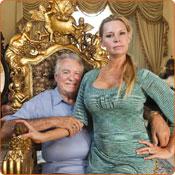When I left the Michigan Theater after viewing the documentary The Queen of Versailles, the world looked crummier than it did when I entered–which, to me, is one of the signs of a good movie. It didn’t just disappear with the kicked-under-the-seat popcorn box, but lingered to haunt me.
The real-life couple at the heart of the film aren’t the type of people you expect to linger in your mind, except as a source of derision or possibly envy. Ridiculously wealthy at the film’s start, David and Jackie Siegel are squeezed when the Great Recession hits–but even in “poverty,” they are living better than most of us with their huge house, nanny, and swimming pool. So they’ve had to give up their private plane and private schools for the eight kids (including Jackie’s niece, whom they’re raising). True, dog poop is everywhere because after firing most of their household staff, there apparently aren’t enough servants in this 26,00 square foot mansion to keep up with Jackie’s dozen or so pooches. But these people think they have troubles? Derisive laughter broke out several times during the showing I caught.
And yet. It’s a sign of the power of The Queen of Versailles that absorbed silence, not ridicule, was the audience’s principal reaction. Filmmaker Lauren Greenfield got a remarkable break when David and Jackie agreed to let her into their lives and their huge home. (They’re suing her now for defamation.) When the film started, the couple is excited about the next adventure of their life–building a home that will be the largest residence in the country. Not that they aimed to set a record, the surprisingly likeable Jackie, insists. It’s just they kept thinking of things it would be nice to have–a bowling alley, a skating rink, bigger servants’ quarters. And why not? David, who grew up in a modest home, has become a billionaire through his time-share business Westgate Resorts. He chums (or did) with the like of former President George W. Bush, Donald Trump, and–which seems to him give special joy–the beautiful, beribboned competitors for the Miss America contest. Apparently more introspective than Trump–granted, that’s setting the bar low–David recalls how he “used to cry” when watching the pageant as a kid. (The tall, gorgeous Jackie is an ex beauty queen.) David also talks about the many people he employs, the jobs he creates, and his assistance–here he turns coy–in helping W get elected. You may not believe this man has led a good life–in the moral, not the consumerist, meaning–but you believe that he believes it.
When the stock market goes bust in 2008, the Siegels’ money tree teeters. Timeshare customers can’t pay what they owe; banks can’t give him loans. The brand new Westgate Resort in Vegas goes literally dark. When a reluctant David finally decides to sell the unfinished Versailles, more surprise–there are no takers. Even billionaires and millionaires who came through intact don’t necessarily want someone else’s ersatz French palace. While the Siegels adjust to their downscaled life–a bewildered Jackie speculates that now her children will have to work for a living–the beast comes out in David. Pride in his wife turns to disdain; when a child, at Jackie’s coaxing, tells David he loves him, he merely says “Thanks.” And Greenfield, for whatever reason, is allowed to keep filming it all.
David and Jackie themselves aren’t all that deep or interesting, but they’re not the source of the movie’s power. What stuck with me was how, despite their gazillion dollar wardrobe and furniture, they seem not that much different from the “ordinary” Americans who got caught in the housing bust. Which seems to point to a moral–or several of them–about the fascination America has with power and beauty, our rampant consumerism, and the obsession with home ownership as the embodiment of the American dream. Houses and homes, from the Filipina nanny’s creating a personal hideout in the kids’ playhouse to the excesses of the “palace,” are a recurring theme here. It’s been suggested that the Millennial generation will be less eager to buy homes than their parents. This depressing, suck-you-in film makes that seem like good news.
